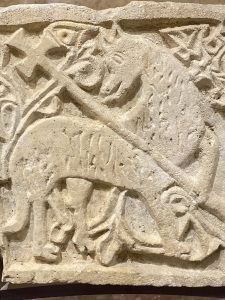Words on the Word
24. Sunday B
Isaiah 50:5-9: The Lord God has opened my ear.
James 2:14-18: If good works do not go with faith, it is quite dead.
Mark 8:27-35: Anyone who wants to save his life will lose it.
Yesterday we kept the feast of the Exaltation of the Cross, venerating the saving sign of our redemption. In today’s readings we are likewise faced, by liturgical coincidence, with resonances of Holy Week. It is as if, at this time of the year, when autumn sets in, winter nears, the Church wants us to focus on essentials. We are drawn into the heart of the mystery of faith. Now, at harvest time, we are to be mindful of the seed that fell into the earth to die, to bear fruit in plenty.
The reading from Isaiah is infinitely moving. For the Church it is a word-icon of Christ mocked, traduced, abused. The image of the suffering servant challenges. What stands out is his non-resistance. Listen again to his resolve: ‘I was not rebellious. I turned not backward. I gave my back to the smiters.’
Does this not go against our deepest instincts? Do we not, even now, in a climate of high political pragmatism, recoil at the idea of innocent suffering? And is there not something deranged about a mute surrender to maltreatment? Our human sensibility militates against the perspective of faith. Of course: there is no glorification of suffering as such in Judaeo-Christian tradition. Pain is an anomaly in our world, a pay-off of the wages of sin. Our faith does not ask us to seek out pain. What it does teach is that, sometimes, pursuit of a higher purpose will mean embracing suffering freely. That is what goes on in the passage from Isaiah. If the suffering servant gives himself up to the smiters, it is because the Lord God has ‘opened his ear’. He is answering a call. He is trying to be faithful. And he enters his travail certain that God is at hand. Twice our passage repeats, ‘God helps me’.
What’s the point of his suffering, though? Isaiah offers a sublime answer. It emerges as a conviction in the final crescendo of his prophecy. God’s chosen one, he tells us, is called upon to bear the grief and pain of others. He gives his life that others may live. It is a matter of one man dying ‘for the people’. In the wake of Jesus’s death on the cross, the early Church re-read the Isaian texts with astonishment. These ancient prophecies electrified new believers, opening their eyes. When in the Gospels we read that Jesus’s Passion took place ‘as it was written’, these are the texts referred to, and with good reason, for we know Christ had them in mind when seeking to make sense of his Passion.
Take the unsettling firmness of the affirmation: ‘The Son of man must suffer’. Christ knew that from the illumination of the Spirit. He knew it, too, from Isaiah’s prediction. Again, let’s be cautious. This ‘must’ does not spell attachment to suffering for its own sake. It is bound up with the nature of his mission from the outset, identified by John. Christ came to ‘take away the sins of the world’. He came to bear them in his body, a body to be broken and sacrificed. Nothing Christ did was for himself; all was for us. His every deed and word, even his silences, were means to effect our redemption. That is why he ‘had to’ suffer. The world as we experience it is a painful place. To be human is to suffer. We ascertain this daily in encounters with sickness, death, fear, broken promises. The world is lovely, too, of course. Its beauty alleviates pain, but does not take it away. Only the cross does, by assuming what hurts, raising it up, transforming it, enlightening in darkness.
The wonder of our faith is this: it enables us to look life squarely in the face, as it is, without need for evasion; it lets us embrace life in and with its pain without losing hope, for we know that an all-powerful grace bears all things, even death’s darkness, even the wounds and tangles of sin. We know that Christ, having borne our sin, having been crucified by it, rose again. Death is dead. Life lives. The promise of redemption is sure. It is not, however, automatic.
We have heard the Lord’s solemn words: ‘If anyone would come after me, let him take up his cross. Whoever would save his life will lose it. Whoever loses his life for my sake will save it.’ The figure of the suffering servant overshadows our lives, too, as it did Christ’s. Like him, we ’must’ suffer. And we must do so, not for our own sake only, but for the sake of the saving of the world.
The cross, for being ‘ours’, must not shut us in. It must break us open, making of our lives a source of consolation for others. This consolation must be evident in deeds. St James tells us there is no point in uttering pious phrases if we don’t act on our stated intention. Such action cannot but come at a cost. Like Isaiah’s servant we may be tempted to rebel, to turn back. Will we? Is our faith alive or dead? Our charity in action will tell. These days, when the world is in flames and masses of poor people pour into our continent hungry for food and friendship, we have ample occasion to test our Christian authenticity. By Christ’s grace, may we not be found wanting. Amen.

